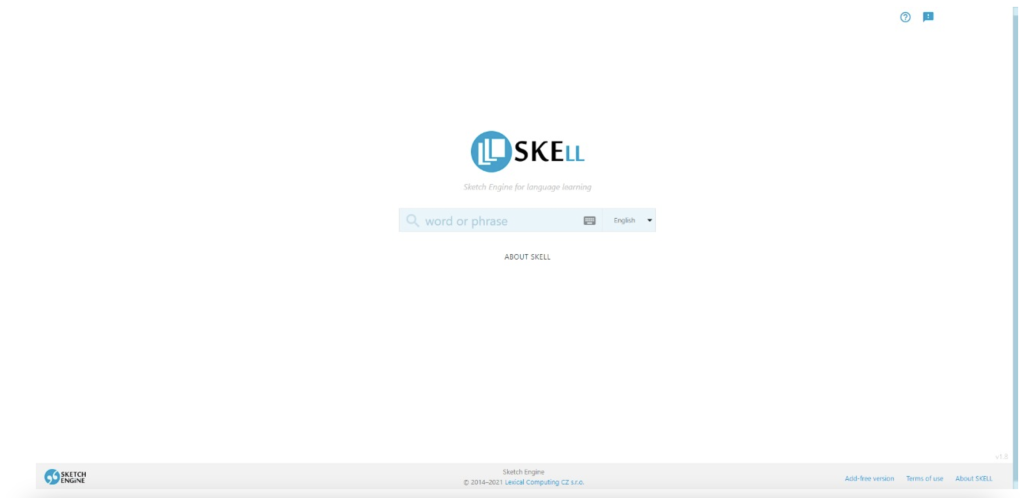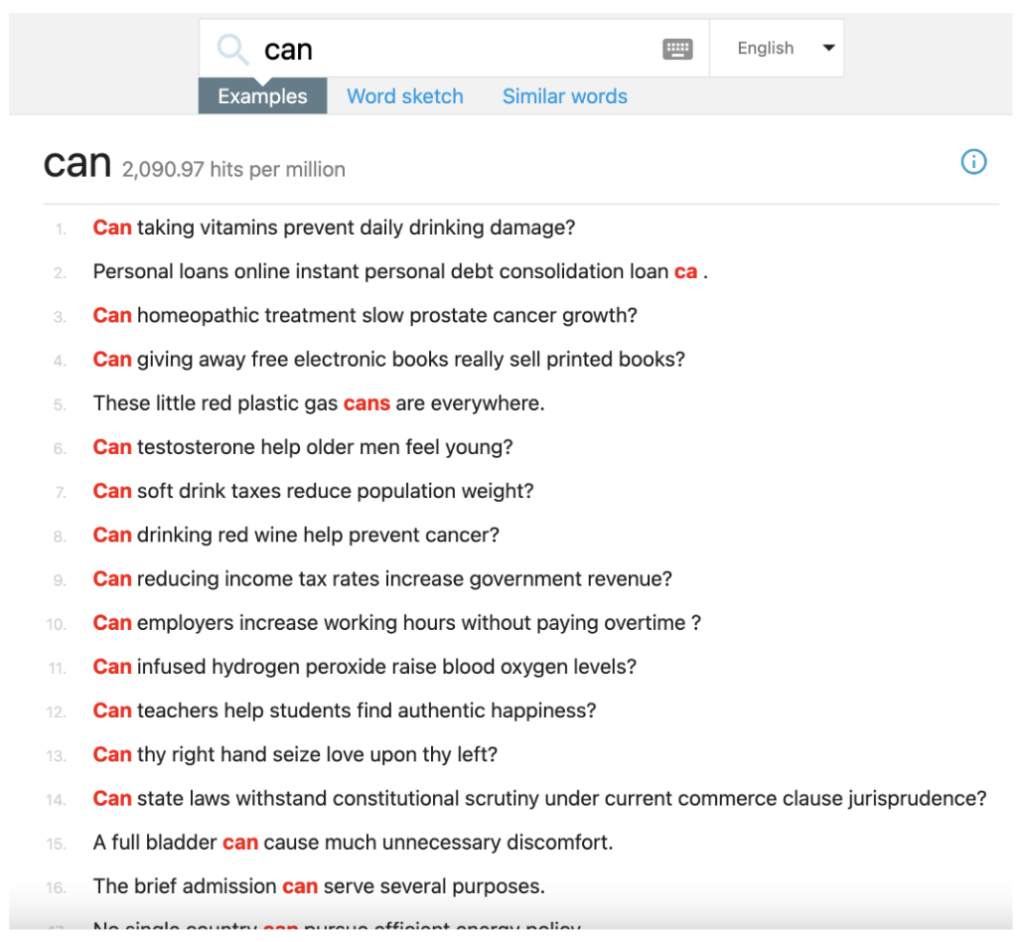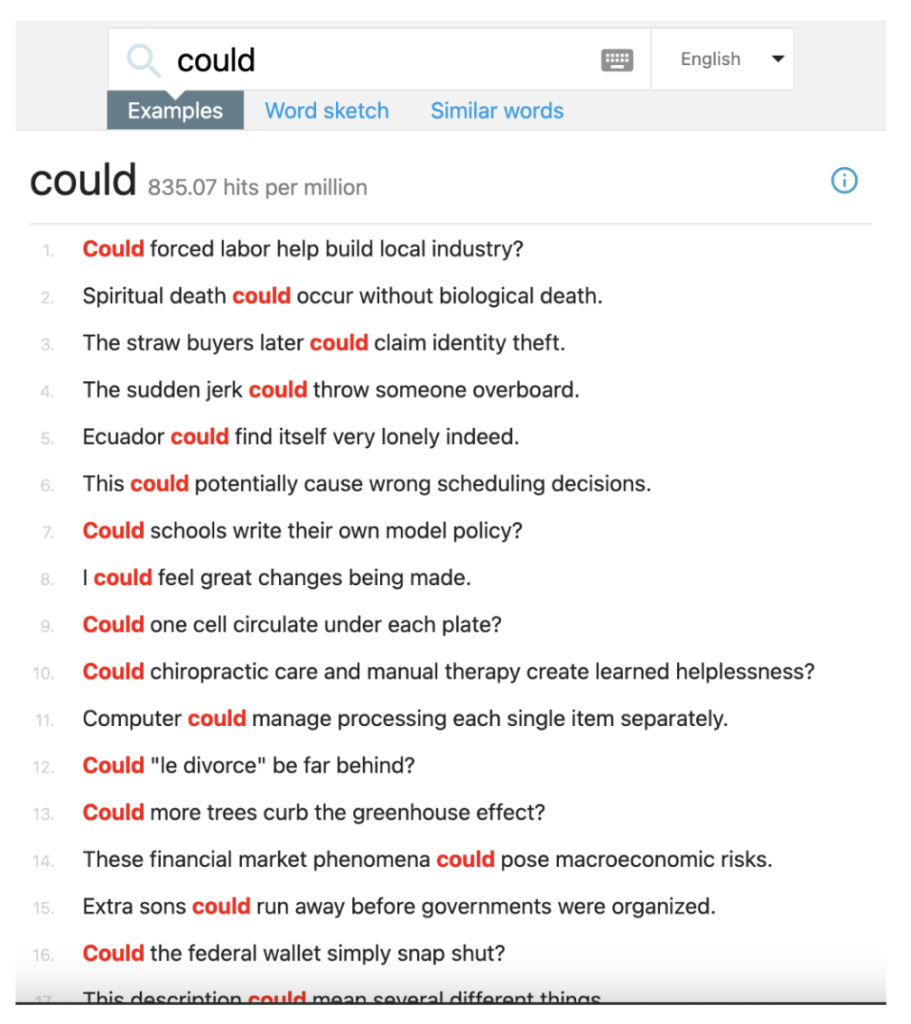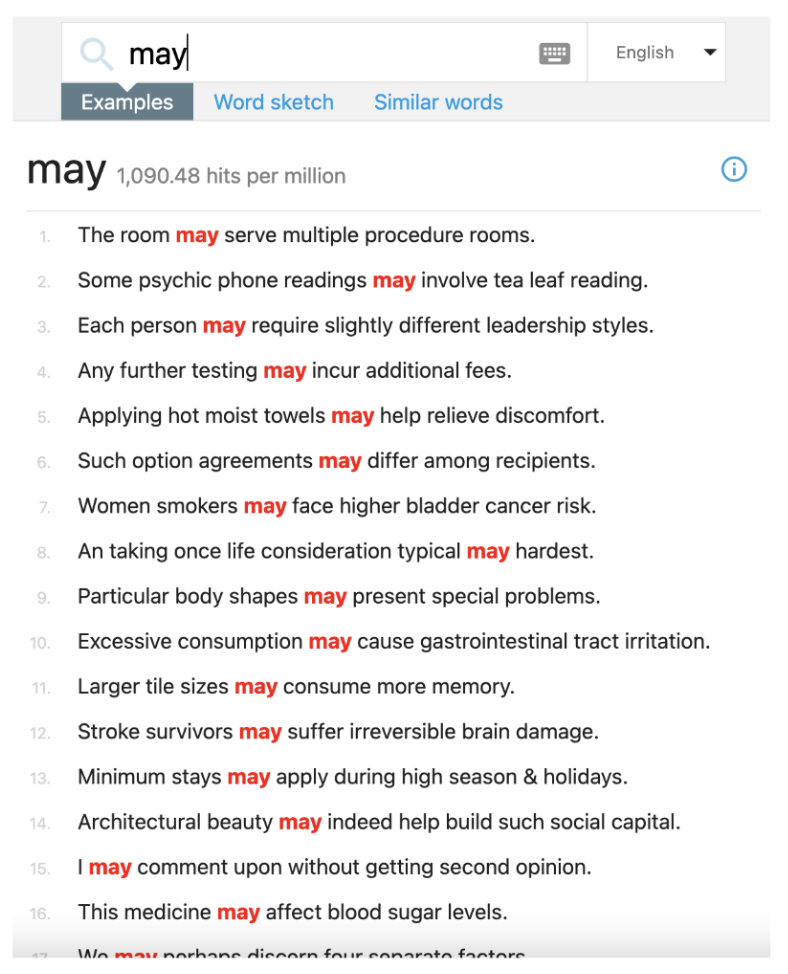14. Can/May/Could you open the window? Using SKELL to study modal verbs
Amanda Camacho; Jader Rocha; Patrick Regis; and Tess Coffey
Amanda Camacho
Undergraduate student at Federal University of Rio Grande do Sul
Jader Rocha
Undergraduate student at Federal University of Rio Grande do Sul
Patrick Regis
Undergraduate student at Federal University of Rio Grande do Sul
Tess Coffey
Undergraduate student at Montclair State University
Goals: To teach students how to use SKELL to understand modal verbs
Audience: Beginner students in English language classes from middle school to adults.
Duration: 30 to 40 minutes.
INTRODUCTION
Modal verbs are an essential part of English grammar. The modal verbs “can”, “could” and “may” are some of the most frequent words in English. They are often used to request information or help, and to establish a polite exchange of information. Studying the differences between these modal verbs in terms of their use can be extremely useful for English learners. Therefore, the goal of this unit is to teach students about the different uses of the modal verbs “can”, “could” and “may”. At the end of this task, students should be able to choose the most suitable use of each modal verb.
STEP 1: CORPUS ANALYSIS
In the first phase of class, we suggest that the teacher uses SKELL to explore the use of these three verbs in context. SKELL is Sketch Engine’s modified search engine for language learning. This tool can be accessed using the following link: https://skell.sketchengine.eu/#home?lang=en. On the website’s home page you will find a search bar where you should type the word you are searching for.

Figure 1 – SKELL home page
Before class, we recommend that the teacher access SKELL to get familiar with the different options the tool offers. With a good command of the platform, the teacher will be able to develop this class in a super informative way. The goal of this tutorial is not only for students to learn about modal verbs, but also to learn how to use SKELL to do their own searches later. We suggest that the teacher use a projector in the classroom, so that all students can watch the step-by-step access to the SKELL platform.
Upon searching a word, three columns will appear in the results: Examples, Word Sketch and Similar Words. The first will show example sentences with the search word. In the next column, contexts will appear in which the word can be used and the syntactic function it has.
In the case of modal verbs, the Word Sketch column will be empty since these words only occur as verbs. In the third column we can find the Thesaurus function. That is, words with the same meaning as the word that was searched will appear .

Figure 2 – SKELL search results for the word “sample” (Example, Word sketch, and Similar words)
The main differences between Modal Verbs MAY, COULD and CAN are the meaning and the way to use each one in the sentences.
- MAY is a Modal Verb that has a sense of probability and indicates something that could happen in the future.
- CAN is used when we want to say whether something can happen or not, if it is possible.
- COULD is a verb that we use to say if someone can do something, in requests.
In the research done on the Skell platform, we made some observations about these Modal Verbs:
- CAN:

Figure 3 – SKELL Example search results for “can”
“Can” is mainly used at the beginning of interrogative sentences questioning possibilities. However, “CAN” also appears in affirmative sentences, but less frequently.
Examples:
1. Can employers increase working hours without paying overtime?
2. A full bladder can cause much unnecessary discomfort.
- COULD:

Figure 4 – SKELL Examples search results for “could”
“Could” appears more frequently in affirmative sentences – indicating the possibility of something happening – and less frequently in interrogatives (unlike the previous Modal Verb).
Example: This could potentially cause wrong scheduling decisions.
- MAY:

Figure 5 – SKELL Examples search results for “may”
“May” appears mainly in affirmative sentences, before other verbs, more formally than other modal verbs.
Example: Women smokers may face higher bladder cancer risk.
STEP 2: PRACTICE ACTIVITY
Activity #1:
The following activity consists of using the most appropriate modal verb for each of the sentences below, prompting students to fill in the blanks in the sentence with the most appropriate modal verb given the context. It can be used as a worksheet to assess students’ understanding of the topic after the lesson.
1. One license server _______ serves many terminal servers simultaneously.
- CAN
- COULD
- MAY
2. _____ I look at your map, please? Yes, you ____.
- CAN / COULD
- COULD / MAY
- MAY / CAN
3. How much will the repair cost? I don’t know. But it _____ be quite expensive.
- CAN
- MAY
- COULD
4. I _____ feel big changes being made last week.
- COULD
- CAN
- MAY
5. I _____ sleep more than 12 hours every day.
- MAY
- CAN
- COULD
6. _____ you lend me this pencil? Yes I _____.
- MAY / COULD
- CAN / CAN
- COULD / MAY
Activity #2:
State if the following modal verbs are correct in the sentence, if they are incorrect replace with the correct modal verb (only using could, may, or can).
- Can we design better preschool science activities?
- Altogether students may earn 120 credit points.
- Women smokers can face higher bladder cancer risk.
- This could potentially cause wrong scheduling decisions
- Such uncertainty may deter potential private freight operators.
- Years may pass before another opportunity arises.
- Can I use the restroom?
- May teachers help students find authentic happiness?
- This medicine may affect blood sugar levels.
- This description can mean several different things.
Answers for Activity #2:
- Correct
- Incorrect; may should be replaced by can
- Incorrect; can should be replaced by may
- Correct
- Incorrect; may should be replaced by could
- Correct
- Incorrect; can should be replaced by may
- Incorrect; may should be replaced by can
- Correct
- Incorrect; can should be replaced by could
Camacho, A., Coffey, T., Regis, P., & Rocha, J. (2023). Can/May/Could you open the window? Using SKELL to study modal verbs. In L. Goulart & I. Veloso (Eds). Corpora in English Language Teaching: Classroom Activities for Teachers New to Corpus Linguistics. Open Educational Resource. Montclair State University.
